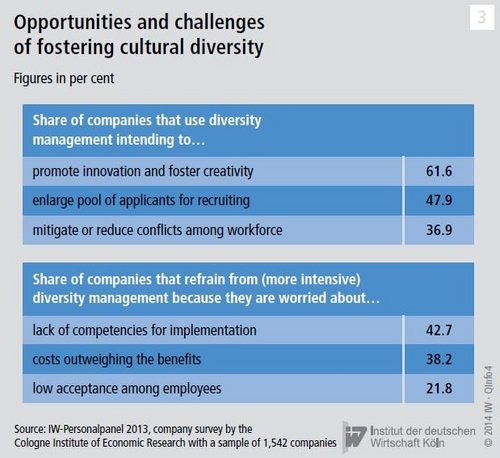Over 16.3 million people with a migration background coming from 190 countries worldwide are currently living in Germany. In 2013, immigration to Germany reached its momentary peak with net migration of around 428,600 people (balance of immigration and emigration) according to the Federal Statistical Office of Germany. However, cultural diversity is not only a reality in our society but an important pillar of the labour market.

How to manage cultural diversity?
The demographic transition is posing a great challenge to the German labour market. In October 2014, labour supply was high with more than 43 million people employed and a further 2 million unemployed; however, a study by the Institute of Employment Research has forecast a decline in the potential labour force to around 32.7 million people in 2050 if net migration of 100,000 per year is assumed. The statistic elaborates on the importance of labour immigration to mitigate future labour shortages of, for instance, doctors, nurses, engineers and technicians. Already today, around 18 per cent of the labour force have a migration background.
Human Resources (HR) managers are aware that companies’ workforces will become more diverse with regard to their employees' cultural and ethnic backgrounds . Results of the ‘IW-Personalpanel’, a representative survey of HR managers in Germany by IW Consult, show that in 2013, the HR departments of more than every second company have already taken steps to actively foster cultural diversity and have implemented measures to meet the specific needs of employees with a migration background.
The range of possible diversity management activities is broad and multifaceted. Nearly every fourth company managed diversity by composing mixed teams with members from different countries or with different cultural backgrounds. Every fifth company included cultural diversity as part of the company culture or offered specific training for employees with a migration background. In contrast, a dedicated contact person for diversity matters within the company or international assignments of employees were only evident in less than 5 per cent of German companies. Larger companies with 250 or more employees were in general more active in managing diversity, in particular concerning formal activities like language training where a certain number of participants is necessary due to efficiency reasons.
From a company’s perspective, fostering cultural diversity held benefits as well as challenges (see table). Among the main challenges, HR managers named costs and a lack of competencies. Two out of five HR managers either felt that they lacked the competencies to implement or expand the diversity management or believed that the costs outweighed the benefits. So, why are the majority of HR managers so keen to foster the cultural diversity of their staff?
Nearly 48 per cent of German HR managers intended to strengthen their employer attractiveness for applicants with a migration background by implementing diversity management. Furthermore, more than 60 per cent of HR managers sought to inspire knowledge exchange and networks of employees with different educational backgrounds and experiences to foster creativity and promote innovation.
The latter motive is supported by a recent empirical study by the Cologne Institute for Economic Research. It indicates that companies that foster intercultural networks by having mixed work teams or international assignments are more innovative than their competitors.
More on the topic

Pharmaceutical industry: Increasing pressure on the labor market
The shortage of skilled workers poses significant challenges for pharmaceutical companies in Germany and is expected to become increasingly problematic in the context of demographic changes. Concerning Germany's positioning in the international competition ...
IW
Immigration from Latin America: Successes and potential for securing skilled workers
Against the background of the baby boomers leaving the labour market, Germany will be increasingly dependent on skilled workers from abroad in the coming years in order to secure growth and prosperity.
IW